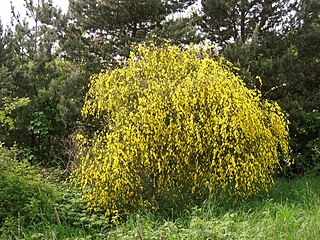
A shrub is a small-to-medium-sized perennial woody plant. Unlike herbaceous plants, shrubs have persistent woody stems above the ground. Shrubs can be either deciduous or evergreen. They are distinguished from trees by their multiple stems and shorter height, less than 6–10 m (20–33 ft) tall. Small shrubs, less than 2 m (6.6 ft) tall are sometimes termed as subshrubs. Many botanical groups have species that are shrubs, and others that are trees and herbaceous plants instead.
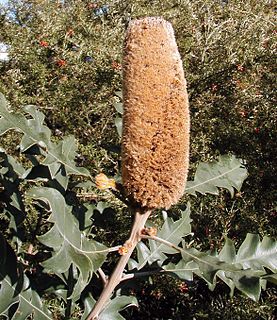
Banksia solandri, commonly known as Stirling Range banksia, is a species of large shrub in the plant genus Banksia. It occurs only within the Stirling Range in southwest Western Australia. Its scientific name honours the botanist Daniel Solander, one of the first collectors of Banksia.

Banksia sphaerocarpa, commonly known as the fox banksia or round-fruit banksia, is a species of shrub or tree in the plant genus Banksia. It is generally encountered as a 1–2 m (3.3–6.6 ft) high shrub, and is usually smaller in the north of its range. This species has narrow green leaves, and brownish, orange or yellow round flower spikes which may be seen from January to July. It is widely distributed across the southwest of Western Australia, growing exclusively in sandy soils. It is usually the dominant plant in scrubland or low woodland. It is pollinated by, and is a food source for, birds, mammals, and insects.

Banksia armata, commonly known as prickly dryandra, is a species of often sprawling shrub that is endemic to Western Australia. It has deeply serrated leaves with sharply pointed lobes and spikes of about 45 to 70 yellow flowers.
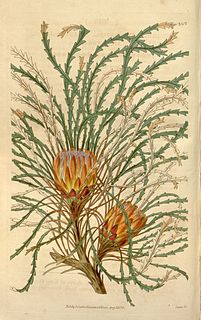
Banksia tenuis is a species of shrub that is endemic to the southwest of Western Australia. It has pinnatifid, serrated or smooth-edges leaves, golden brown and cream-coloured flowers in heads of about fifty-five and glabrous, egg-shaped follicles.
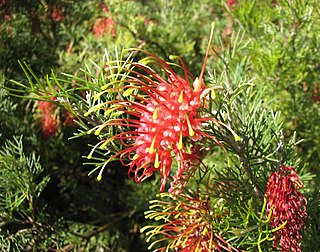
Grevillea thelemanniana, the spider-net grevillea or hummingbird bush, is a small, spreading shrub endemic to Western Australia.

Hakea orthorrhyncha, commonly known as bird beak hakea, is a shrub which is endemic to the Murchison River area of Western Australia.
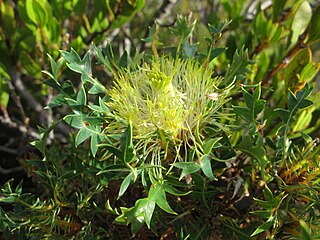
Banksia armata var. ignicida is a variety of shrub that is endemic to Western Australia. It differs from the autonym in not having a lignotuber. It is also usually a taller plant with leaves that are longer with fewer side lobes, and longer flowers.
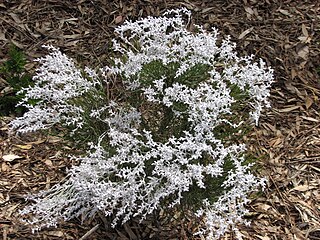
Conospermum stoechadis, commonly known as common smokebush, is a shrub endemic to Western Australia.
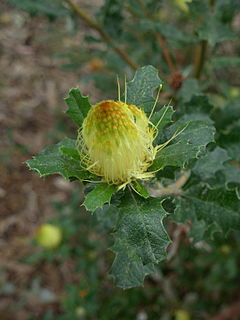
Banksia undata var. undata is a shrub endemic to Western Australia.
Banksia undata var. splendens is a shrub endemic to Western Australia.

Grevillea umbellulata is a shrub which is endemic to the south-west of Western Australia.
Banksia gardneri var. gardneri is a variety of Banksia gardneri. As an autonym, it is defined as encompassing the type material of the species. It is native to the Southwest Botanical Province of Western Australia.

Banksia gardneri var. brevidentata is a variety of prostrate shrub that is endemic to the south-west of Western Australia.
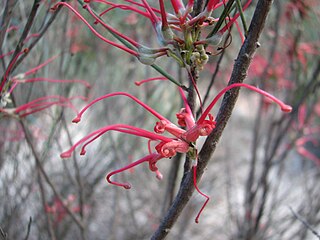
Grevillea sarissa, the wheel grevillea, is a shrub which is native to South Australia and Western Australia.

Grevillea eriostachya, also known as flame grevillea, orange grevillea, or honey grevillea, is a species of flowering plant in the family Proteaceae and is endemic to western parts of Australia. It is a shrub with a leafy base, mostly linear leaves and conical groups of bright yellow flowers on long canes above the foliage.

Grevillea confertifolia, commonly known as Grampians grevillea or dense-leaf grevillea, is a species of flowering plant in the family Proteaceae and is endemic to the Grampians in Victoria, Australia. It is a spreading, often dense shrub with linear to narrowly oblong leaves, and reddish-purple flowers.

Persoonia muelleri, commonly known as Mueller’s geebung, is a shrub endemic to Tasmania. It forms a shrub in open areas of wet forests in the west and northeast of the state. It is occasionally confused with P. gunnii though it has larger flowers and longer, straighter leaves.
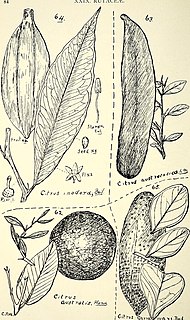
Citrus garrawayi, the Mount White lime, is a tree native to the Cape York region of northern Queensland in Australia. It is an understory tree in tropical rainforests.
Citrus inodora or Microcitrus inodora, commonly known as Russell River lime or large leaf Australian wild lime, is a tree native to the Bellenden-Ker Range in northern Queensland, Australia.


















